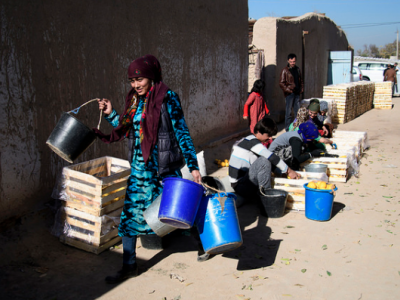Statement by Pratibha Mehta at GCF Dialogue
Submitted by Louis da Costa on 18 September 2018

11 September 2018 - Kohi Navruz, Tajikistan - Statement by Dr. Pratibha Mehta, UN Resident Coordinator in Tajikistan at the GCF Structured Dialogue with Eastern Europe and Central Asia
Climate change presents one of the biggest threats to development. Severe weather conditions resulting in unprecedented natural calamities that hit homes, families and economies will increase poverty, food insecurity, forced migration and diseases. Its widespread effects disproportionately impact the poorest and the most vulnerable, especially women and children who bear much of the brunt.
The obvious relationship between social, economic and environmental development prompted the UN Member States to adopt Agenda 2030 with 17 Sustainable Development Goals (SDGs) , recognizing that people, planet, prosperity and peace are interrelated. The SDGs also present an opportunity to meet the climate change challenge that permeates the whole Agenda 2030 and is embedded in 14 out of 17 SDGs, with a specific SDG 13 that calls for urgent action not only to combat climate change and its impacts, but also to build resilience.
The Paris Climate Agreement is not only an instrument to address climate change but also to help achieve the SDG’s. Multilateral climate funds are a critical source of funding for countries to utilize public finance to drive necessary economic and societal transformations for sustainable development and the Green Climate Fund (GCF) is one of several key platforms for ensuring that the obligations under the Paris agreement and SDGs are met. GCF is now the centrifugal force for the world to rally around with a massive mobilization and distribution of not only direct funding but also lines of credit, private climate capital; $500 million for innovative ideas via its “Pitch for the Planet” and for sharing of expertise and experiences.
The GCF Structured Dialogues are important forums to discuss priorities, pipelines, procedures and share experiences to make collaboration more effective and efficient. An effective global architecture for climate finance must promote coordinated internal planning processes, ensure complementarity among different funds, and encourage broad stakeholder engagement. We encourage GCF and other multilateral funding platforms and governing bodies to engage with each other more closely to minimize duplications and inefficiencies while distinguishing their respective strategic niches.
This would require funds like the GCF to think strategically and collaboratively about who is best placed to serve different thematic and geographic areas, who should support which activities, and how needs will evolve over time. Funds could improve coordination by having their secretariats and boards engage with each other more closely.
At the country level, we should encourage holistic climate change programming and planning and not just limited to a fund-specific portfolio. For example, the development of GCF country programs should be based on Nationally Determined Contributions (NDCs, to CO2 emission reductions), and not developed as separate plans and projects. The United Nations believes that the best way to deliver long-term sustainability is to ensure that development is zero-carbon and risk-informed and we are proud of our partnership with GCF and the numerous milestones we have achieved with GCF over the last several years.
UN entities are not just delivering partners of funds and government but trusted partners to help broker partnerships and support long term capacity development for transformation so countries can meet their inter-governmental obligations. It is encouraging that the GCF proposals are supporting the mainstreaming of climate risks into planning and budgeting under the National Adaptation Plan processes. UNDP – together with UNEP, FAO and GIZ - are leading much of the in-country support to countries on NAP process and its close alignment with the SDG agenda.
UN entities have invested significant time and their resources to engage with GCF and develop projects for GCF on behalf of partner countries to tackle climate change and advance SDGs. The success of GCF and UN entities in assisting countries tackle climate change and achieve the SDGs is fundamentally intertwined. UN is determined to accelerate engagement with the GCF and other potential sources of climate, development and/or blended finance to help source investments for partner countries. I hope that the structured dialogue opening today will help advance GCF country support in a manner that supports national financing needs to meet Paris agreement and SDGs.
Also published by UNDP Tajikistan